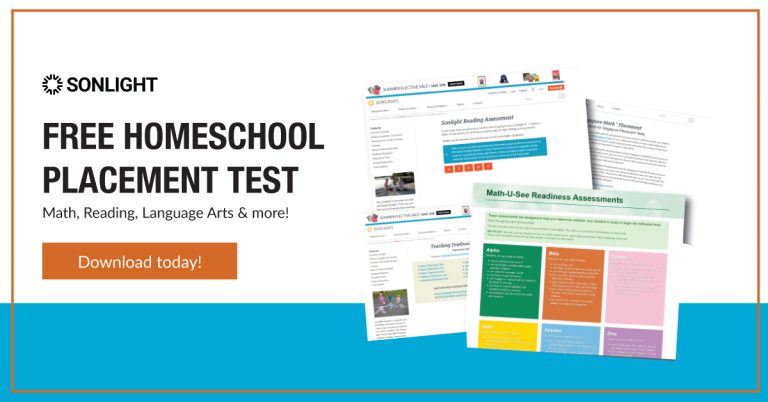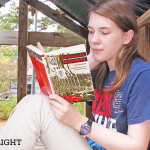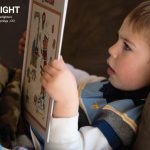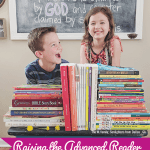If you’re raising an advanced reader, you are probably, like me, thankful for the public library. We have raised ten kids who love books. You can imagine, that’s a ton of books being schlepped back and forth, piled in little boxes and cubbies—representing a mountain of financial savings.
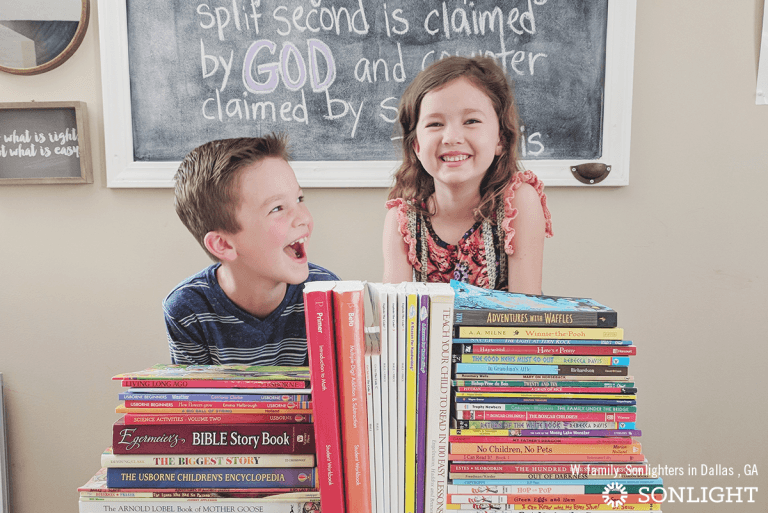
We had a couple of young readers who were hungry to move up the reading shelves as quickly as possible, devouring more challenging material. Although I wanted to provide the books they craved, I also needed discernment in choosing books that matched their maturity levels.
When their little hands started reaching for longer and tougher books I asked, "How do I satisfy their desire for more difficult reading while protecting them from adult themes they aren’t ready for?”
When reading ability is outpacing emotional maturity, it can be a challenge to find suitable books. Here is what I learned in my quest to appropriately challenge my advanced readers while protecting their impressionable hearts.
YA Books Don’t Always Mean Higher a Reading Level
The Young Adult (YA) section of the library was tempting new territory for my advanced readers. A few familiar titles made it seem like a natural place to find books. However, after talking to my local children's librarian I learned a key fact. The YA designation of literature is recommended for readers in their teens, usually due to the maturity of the subject matter and not due to the reading level as you may assume.
She told me about her experience using the Accelerated Reader Bookfinder to determine the reading level of books. Most of the YA books in her collection were written to a fifth grade level—not especially advanced, yet many of the books had content that my elementary aged advanced readers simply weren't ready for.
My librarian did put me onto the trail of two great options for high level reading, though, and I found two others on my own:
- picture books
- poetry
- nonfiction
- current events
1. Picture Books for the Advanced Reader
It is not surprising when you think of it, after all, picture books are almost exclusively written with adult readers in mind, so they have a broad and rich vocabulary. They are written to speak to children’s interests however, with subjects that are engaging and art that inspires creativity. I confidently piled up more picture books, knowing these would challenge my young readers more than a YA novel.
2. Poetry for the Advanced Reader
Poetry scored high on the AR index because of its complex structure and diverse vocabulary. These are precisely the ingredients that help to build critical thinking and strong reading skills. After speaking with our librarian, I was grateful that Sonlight curriculum includes poetry collections for every level.
3. Nonfiction for the Advanced Reader
In my own search of the AR book-finder site, I saw that the greatest source of upper level reading is nonfiction. For example, books about history and technology are full of rich new vocabulary for young readers.
How do we enjoy nonfiction in our home? We love to explore a stack of books that cover a specific subject, like when we read Carry On Mr. Bowditch and checked out all of the books on sailboats. The beauty of nonfiction is that you can always find a few books about the subjects you are covering in school if you want to extend your lessons into recreational reading time.
4. News and Current Events Articles for the Advanced Reader
My last source of advanced reading material is current events. We have used WORLD Magazine for ten years. We received the physical magazine then transitioned into the digital age by switching to the online format. We love that WORLD comes from a Christian worldview and is available in age categories you can choose to fit your family.
I also found Newsela and signed up for a free account. It is a secular site but is full of current news and events. The site allows you to choose news articles and to set the reading level of that article for your child, from 3rd to 12th grade. Difficult vocabulary words are highlighted and defined in the text making integration of new words easy for your child to do as they read.
Homeschooling the Advanced Reader Takes Planning
Incorporating high index picture books, beautiful poetry, nonfiction, and news articles made it easy for me to find satisfying reading that filled my advanced readers' minds with information even outside of school time. I was able to always have a supply of new reading material ready for them.
When my young teens were ready to start choosing YA books for themselves, we helped them transition by doing a personal study on discernment, written by a fellow homeschool graduate. It gave me confidence that my children were ready to take over their library experience with good judgement. It is hard to believe, but this group of readers is entering college in the fall. We are still talking about what they are reading but now, they are giving me great book recommendations, too.
If you are not sure your young reader's reading level, you can check with a free Sonlight reading assessment.


